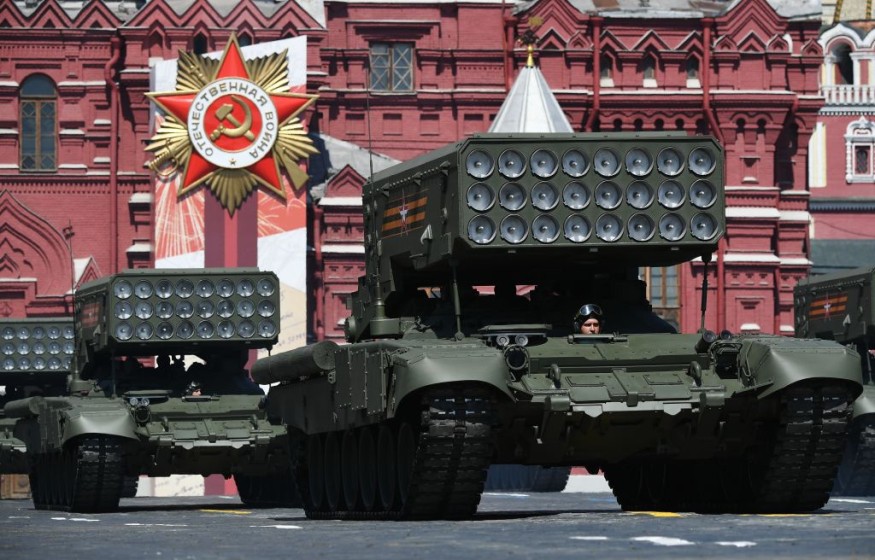Ministry of Defense of the United Kingdom said Russia has acknowledged using a thermobaric weapon system in Ukraine.
However, it has remained unclear how the deadly weapons, which are prohibited when used against people, were deployed.

MOSCOW, RUSSIA - JUNE 24: TOS-1A Solntsepyok (Blazing Sun) multiple thermobaric rocket launchers during the Victory Day military parade in Red Square marking the 75th anniversary of the victory in World War II, on June 24, 2020 in Moscow, Russia. The 75th-anniversary marks the end of the Great Patriotic War when the Nazi's capitulated to the then Soviet Union.
Russia Allegedly Uses Thermobaric Weapons
The Russian Ministry of Defense admitted using the Russian TOS-1A Heavy Flamethrower weapon system in Ukraine, the UK Ministry of Defense tweeted Wednesday afternoon.
The technique allows rockets with thermobaric warheads to be fired from tanks, sucking oxygen from the surrounding air and exploding at a high temperature.
The Russian MoD has confirmed the use of the TOS-1A weapon system in Ukraine. The TOS-1A uses thermobaric rockets, creating incendiary and blast effects.
— Ministry of Defence 🇬🇧 (@DefenceHQ) March 9, 2022
Watch the video below for more information about this weapon and its devastating impact.
🇺🇦 #StandWithUkraine🇺🇦 pic.twitter.com/d8PLQ0PhQD
The UK's announcement was followed by a video of the Soviet-era weapon, which fires rockets from atop a tank's body, sucking in oxygen from the environment, resulting in greater temperatures and more devastating explosions that endure longer than ordinary bombs.
According to Forbes, thermobaric weapons may inflict far more damage than conventional weapons across a considerably larger area.
The Hill said thermobaric weapons are not prohibited under international rules of armed conflict. However, they can't be deployed against military objectives if their launch may kill people.
Oksana Markarova, Ukraine's ambassador to the United States, made identical claims to American senators.
Russia's acknowledgment comes as US officials and legislators warned that Moscow was ramping up its brutality in Ukraine, with hundreds of civilians, including children, being murdered in attacks.
Russia has been criticized for attacking civilian infrastructures such as telephone networks, schools, and hospitals.
Thermobaric Weapons Explained
Thermobaric weapons, commonly referred to as vacuum bombs, are divisive. According to BBC News, these bombs are far more lethal than conventional explosives of similar size, and anyone caught in their explosion radius suffers greatly.
Sky News further explained that thermobaric weapons draw oxygen from the surrounding air to create a high-temperature explosion with a blast wave that lasts far longer than a traditional explosive.
These bombs, according to reports, can vaporize human beings.
A vacuum bomb, also known as an aerosol bomb or fuel air explosive, comprises two distinct explosive charges in a gasoline container.
It may be launched like a rocket or dropped from an airplane as a bomb. The initial explosive charge detonates as it strikes its target, opening the container and dispersing the fuel mixture as a cloud.
The cloud can penetrate any building holes or defenses that aren't completely sealed. The cloud is then detonated with a second charge, resulting in a large flame, a massive blast wave, and a vacuum that absorbs all surrounding oxygen. The weapon can destroy reinforced structures and equipment and kill or injure people.
Since vacuum bombs suck up all the oxygen, the victims cannot breathe following the explosion and die by asphyxiation. Aside from the suffocation, the pressure from the blast could crush a person to death and cause major internal damage to the organs, including ruptured lungs.
RELATED ARTICLE : Ex-NASA Astronaut Scott Kelly Tells Roscosmos Head Dmitry Rogozin to Find McDonald's Job in Twitter Fight
Check out more news and information on Energy in Science Times.










